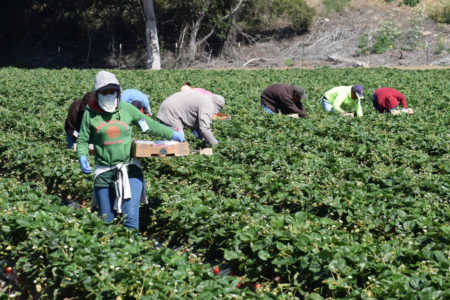Latino farmworkers living in rural communities are experiencing some of the most devastating effects of the coronavirus pandemic.
These laborers are experiencing high rates of COVID-19 infections. Their access to medical care, which was limited even before the virus, has only worsened during the pandemic.
On top of everything else, farmworkers are also having to battle against poor workplace treatment, according to Rosalinda Guillen, the Executive Director of Community to Community Development.
“There’s just a myriad of indignities that the workers suffered at those packing sheds that we’re hearing from other workers in other areas where the same thing is happening over and over and over again,” Guillen said. “It is about the disease. It is about workers feeling that finally it is made really clear that their lives don’t matter, that they are sacrificing the farmworkers’ lives in order to keep the production lines going.”
Problems Impacting Laborers and Farmworkers
While there have been sharp spikes of COVID-19 in major cities, rural communities are facing significant problems as well.
For those who work on farms in these areas, there is a significant health risk associated with that line work — not from the job itself, but the lack of access to the necessary measures to stay safe and avoid exposure to the virus.
It’s so bad that a full-scope understanding of the issue at-large is murky, according to Rosalinda Guillen, Executive Director of Community to Community Development.
This has led to some agricultural workers to erupt in protest over work safety.
“I would just like to name Armida. She’s in the Yakima Valley. She’s one of the packing shed workers that went out on strike,” Guillen said in a recent interview with Spokane Public Radio. “When she talks to me about her life, and her children, and her job in the packing shed, and how hard they work, and when they walked out how frustrated they were simply because they were asking for masks.”
Moreover, when some agricultural business owners have not distributed necessary protective measures to their employees. Instead, they are available for purchase.
“When she didn’t have the money to buy the masks, they were selling them the masks,” Guillen said. “The frustration and anger that they felt, when they asked their supervisor ‘Why are you wearing a mask that says N95, and you give us these other ones that look, clearly, cheaper and less protective? This virus doesn’t distinguish between you and me, why do you get a better mask and we don’t?’”
This only goes to further the worst crack in the foundation of this issue: That much agricultural lack access to healthcare and government assistance.
“An estimated 49% of horticulture workers lack work authorization to work in the US,” National Center for Farmworker Health (NCFH) states. “This means that at least half of all horticulture workers are not able to access unemployment benefits if they are laid off or furloughed. Undocumented workers were also not eligible to receive the federal stimulus money sent to families through the CARES Act.
“US citizen spouses married to a spouse without a Social Security number are also ineligible, which may impact many agricultural worker households with mixed immigration status.”
Latinos and COVID-19 Exposure in Rural Communities
Latinos make up 23% of the agriculture, forestry, fishing, and hunting industry.
With such a large share made up of one of America’s minority groups, advocates say government officials need to pay closer attention to rural communities. Yet, rural communities face a shortage of physicians, hospital closures, and less connection to emergency health services and life-changing appointments with specialty care doctors. These “hospital deserts” have higher rates of poverty and low rates of health education and awareness.
Now, these small towns are showing dangerous COVID-19 rates, according to the NCFH.
“As of August 17th, 98% of rural counties in America had reported positive COVID-19 cases, and 65% had reported one or more deaths,” the NCFH states. “More than 560,000 rural residents have tested positive for COVID-19, and 12,666 deaths among rural Americans have been attributed to the disease.”
Guillen said these issues are why her group fights to “make things right” for farmworkers. 
“This is why we will hold the state agencies and the governor accountable for overlooking us, for thinking that it’s okay to take the brown farmworkers and sacrifice their lives in order for the agricultural industry to keep their economic numbers up like they always have.”
Without agricultural workers, America will face significant issues, according to numerous health advocates.
“Farmworkers feed the world through their labor, bringing fruits, vegetables, and other crops to homes across the nation,” Farmworker Justice, League of United Latin American Citizens (LULAC), Unidos US, and others wrote in a recent statement. “Their work is critical, yet they and their work have not been appropriately valued. Farmworkers earn poverty wages, work under substandard conditions, and face a myriad of health and other issues due to their living and employment conditions.
“Given this reality and the onset of the global COVID-19 pandemic, we are gravely concerned about the health and welfare of the farmworker community, their families, and the security of our entire food supply.”
What Can You Do to Promote Healthy Environments Where You Live, Urban, or Rural?
Get a “Health Equity Report Card” for Your Area!
Select your county name and get a customized Health Equity Report Card by Salud America! at UT Health San Antonio. You will see how your area stacks up in housing, transit, poverty, health care, healthy food, and other health equity issues. These compare to the rest of your state and nation.
You can email your Health Equity Report Card, share it on social media, and use it to make a case for community change to boost health equity.
Get your health equity Report Card!
The post Coronavirus and its Destructive Impacts on Rural Communities appeared first on Salud America.
Recommend0 recommendationsPublished in Fit Fiesta Force, Fuerza por la Salud
